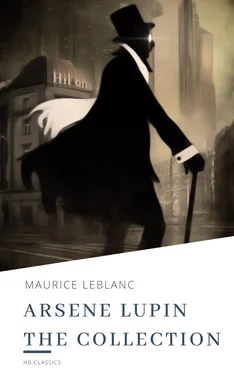"Instead of that," said Sholmes, sneeringly, "I have mixed the cards and sown the seeds of discord in the bosom of a family that was under your protection."
"Mon Dieu! of course, I was protecting them. Must a person steal, cheat and wrong all the time?"
"Then you do good, also?"
"When I have the time. Besides, I find it amusing. Now, for instance, in our last adventure, I found it extremely diverting that I should be the good genius seeking to help and save unfortunate mortals, while you were the evil genius who dispensed only despair and tears."
"Tears! Tears!" protested Sholmes.
"Certainly! The d'Imblevalle household is demolished, and Alice Demun weeps."
"She could not remain any longer. Ganimard would have discovered her some day, and, through her, reached Madame d'Imblevalle."
"Quite right, monsieur; but whose fault is it?"
Two men passed by. Sholmes said to Lupin, in a friendly tone:
"Do you know those gentlemen?"
"I thought I recognized one of them as the captain of the steamer."
"And the other?"
"I don't know."
"It is Austin Gilett, who occupies in London a position similar to that of Monsieur Dudouis in Paris."
"Ah! how fortunate! Will you be so kind as to introduce me? Monsieur Dudouis is one of my best friends, and I shall be delighted to say as much of Monsieur Austin Gilett."
The two gentlemen passed again.
"And if I should take you at your word, Monsieur Lupin?" said Sholmes, rising, and seizing Lupin's wrist with a hand of iron.
"Why do you grasp me so tightly, monsieur? I am quite willing to follow you."
In fact, he allowed himself to be dragged along without the least resistance. The two gentlemen were disappearing from sight. Sholmes quickened his pace. His finger-nails even sank into Lupin's flesh.
"Come! Come!" he exclaimed, with a sort of feverish haste, in harmony with his action. "Come! quicker than that."
But he stopped suddenly. Alice Demun was following them.
"What are you doing, Mademoiselle? You need not come. You must not come!"
It was Lupin who replied:
"You will notice, monsieur, that she is not coming of her own free will. I am holding her wrist in the same tight grasp that you have on mine."
"Why!"
"Because I wish to present her also. Her part in the affair of the Jewish lamp is much more important than mine. Accomplice of Arsène Lupin, accomplice of Bresson, she has a right to tell her adventure with the Baroness d'Imblevalle—which will deeply interest Monsieur Gilett as an officer of the law. And by introducing her also, you will have carried your gracious intervention to the very limit, my dear Sholmes."
The Englishman released his hold on his prisoner's wrist. Lupin liberated Mademoiselle.
They stood looking at each other for a few seconds, silently and motionless. Then Sholmes returned to the bench and sat down, followed by Lupin and the girl. After a long silence, Lupin said: "You see, monsieur, whatever we may do, we will never be on the same side. You are on one side of the fence; I am on the other. We can exchange greetings, shake hands, converse a moment, but the fence is always there. You will remain Herlock Sholmes, detective, and I, Arsène Lupin, gentleman-burglar. And Herlock Sholmes will ever obey, more or less spontaneously, with more or less propriety, his instinct as a detective, which is to pursue the burglar and run him down, if possible. And Arsène Lupin, in obedience to his burglarious instinct, will always be occupied in avoiding the reach of the detective, and making sport of the detective, if he can do it. And, this time, he can do it. Ha-ha-ha!"
He burst into a loud laugh, cunning, cruel and odious.
Then, suddenly becoming serious, he addressed Alice Demun:
"You may be sure, mademoiselle, even when reduced to the last extremity, I shall not betray you. Arsène Lupin never betrays anyone—especially those whom he loves and admires. And, may I be permitted to say, I love and admire the brave, dear woman you have proved yourself to be."
He took from his pocket a visiting card, tore it in two, gave one-half of it to the girl, as he said, in a voice shaken with emotion:
"If Monsieur Sholmes' plans for you do not succeed, mademoiselle, go to Lady Strongborough—you can easily find her address—and give her that half of the card, and, at the same time, say to her: Faithful friend . Lady Strongborough will show you the true devotion of a sister."
"Thank you," said the girl; "I shall see her to-morrow."
"And now, Monsieur Sholmes," exclaimed Lupin, with the satisfied air of a gentleman who has fulfilled his duty, "I will say good-night. We will not land for an hour yet, so I will get that much rest."
He lay down on the bench, with his hands beneath his head.
In a short time the high cliffs of the English coast loomed up in the increasing light of a new-born day. The passengers emerged from the cabins and crowded the deck, eagerly gazing on the approaching shore. Austin Gilette passed by, accompanied by two men whom Sholmes recognized as sleuths from Scotland Yard.
Lupin was asleep, on his bench.
THE END.
The further startling, wonderful and thrilling adventures of "Arsène Lupin" will be found in the book entitled "Arsène Lupin Gentleman-Burglar".
Maurice Leblanc
(Translator: Teixeira de Mattos Alexander)
Published:1911
Categorie(s):Fiction, Mystery & Detective
Raymonde listened. The noise was repeated twice over, clearly enough to be distinguished from the medley of vague sounds that formed the great silence of the night and yet too faintly to enable her to tell whether it was near or far, within the walls of the big country- house, or outside, among the murky recesses of the park.
She rose softly. Her window was half open: she flung it back wide. The moonlight lay over a peaceful landscape of lawns and thickets, against which the straggling ruins of the old abbey stood out in tragic outlines, truncated columns, mutilated arches, fragments of porches and shreds of flying buttresses. A light breeze hovered over the face of things, gliding noiselessly through the bare motionless branches of the trees, but shaking the tiny budding leaves of the shrubs.
And, suddenly, she heard the same sound again. It was on the left and on the floor below her, in the living rooms, therefore, that occupied the left wing of the house. Brave and plucky though she was, the girl felt afraid. She slipped on her dressing gown and took the matches.
"Raymonde—Raymonde!"
A voice as low as a breath was calling to her from the next room, the door of which had not been closed. She was feeling her way there, when Suzanne, her cousin, came out of the room and fell into her arms:
"Raymonde—is that you? Did you hear—?"
"Yes. So you're not asleep?"
"I suppose the dog woke me—some time ago. But he's not barking now. What time is it?"
"About four."
"Listen! Surely, some one's walking in the drawing room!"
"There's no danger, your father is down there, Suzanne."
"But there is danger for him. His room is next to the boudoir."
"M. Daval is there too—"
"At the other end of the house. He could never hear."
They hesitated, not knowing what course to decide upon. Should they call out? Cry for help? They dared not; they were frightened of the sound of their own voices. But Suzanne, who had gone to the window, suppressed a scream:
"Look!—A man!—Near the fountain!"
A man was walking away at a rapid pace. He carried under his arm a fairly large load, the nature of which they were unable to distinguish: it knocked against his leg and impeded his progress. They saw him pass near the old chapel and turn toward a little door in the wall. The door must have been open, for the man disappeared suddenly from view and they failed to hear the usual grating of the hinges.
Читать дальше












